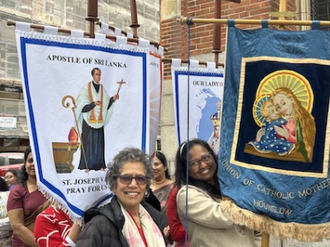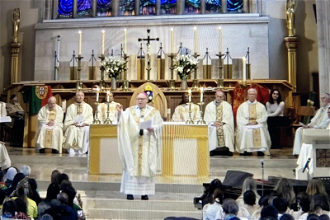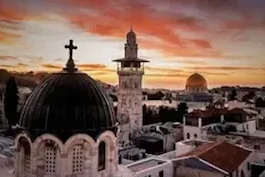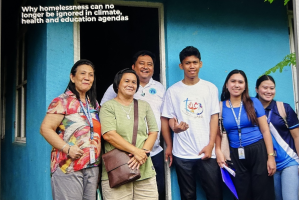Text: Fr Dominic Robinson SJ at Migrants Mass 2025

Image: ICN/JS
"Where are you from?" is one of those questions which often catches me off guard as I'm never quite sure how to answer it. I end up thinking to myself is the questioner interested in which parish I serve as a parish priest, where I grew up, where I live now.
It's an open question which can serve as a good invitation to a conversation in which you get to know a person a little but any specific answer could limit what there is to discuss.
If I say I'm from Lancashire because I was born and brought up there we could spend half an hour talking about everything Lancastrian; if I say I'm a parish priest in central London the initial assumption might be I was always a city dweller and miss the part of me which is of the country.
What if I say I'm not from anywhere in particular as I'm a Jesuit priest who can be sent anywhere in the world - but then that doesn't tell the full story as it doesn't indicate how I'm rooted in a particular place and the different places I've lived also shape me.
What I know is where we all come from is complex: it's shaped by DNA going way back centuries, by the movement of peoples between country and cultural boundaries, by the experience of what we do with our lives - our training, our expertise, professions, contributing to a complex multicultural society. The more I think about the question of who I am the more an innocent question can become an occasion of gratitude for how beautifully diverse we are, how our diversity contributes to society, and to God whose grandeur is revealed through this beautiful creation.
This annual celebration is such a vital fixture in the calendar for us as Catholics in London - and not just for us Catholics as it's wonderful to have among us representatives of other Churches and faiths and civic authorities and agencies. The exuberance of this celebration, with procession, banners, music, a little dance, the diversity of language and colour, says something really important about who we are as a multicultural diverse Church and who we are as Londoners. But it also goes much deeper than that. Because what we're celebrating today is not just our international diversity but how the migrant population of London - and in a sense we are all migrants - contributes so much to our city through the world of work. It says so much about the heart of this great city as a city fuelled through its international workforce, a workforce who deserve always to be made feel welcome and at home here, to thrive here in professional life, to put down roots, and so to help shape what London has always been about: a place where the whole world meets and where peoples from across cultures build a civic society which promotes civilisation through the dignity of fulfilling work.
The dignity of work, something which we are all entitled to, wherever we come from as it were. This feast of St Joseph the Worker was instituted to celebrate the gift of our work as a gift from God, a gift which a truly just society wants to promote and to enshrine in law. This is such a vital part of the teaching of the Catholic Church - and indeed of other Christians and those of all faiths and none. And the figure of St Joseph, the earthly father of Our Lord whose everyday life was shaped by work, gives us a model of how to be a Christian involves respecting and promoting fulfilling work for all. Pope Francis, who had a particular devotion to St Joseph, expressed it this way:
'Saint Joseph was a carpenter who earned an honest living to provide for his family. From him, Jesus learned the value, the dignity and the joy of what it means to eat bread that is the fruit of one's own labour.
In our own day, when employment has once more become a burning social issue, and unemployment at times reaches record levels even in nations that for decades have enjoyed a certain degree of prosperity, there is a renewed need to appreciate the importance of dignified work, of which Saint Joseph is an exemplary patron.
Work is a means of participating in the work of salvation, an opportunity to hasten the coming of the Kingdom, to develop our talents and abilities, and to put them at the service of society and fraternal communion…
Working persons, whatever their job may be, are cooperating with God himself, and in some way become creators of the world around us. The crisis of our time, which is economic, social, cultural and spiritual, can serve as a summons for all of us to rediscover the value, the importance and necessity of work for bringing about a new "normal" from which no one is excluded…
Let us implore Saint Joseph the Worker to help us find ways to express our firm conviction that no young person, no person at all, no family should be without work!' (Francis, Apostolic Letter Patris Corde, 2020)
Strong words echoing from five years ago just after the pandemic. Words which connect my everyday life - built around work as a parish priest - to St Joseph. He knew the everyday grind, the satisfaction, the frustration, the necessity of my everyday ploughing the furrow, sowing the seed. As we hear in the Gospel he was the local carpenter, serving the local population, earning his family's keep, a good and just man. What better an earthly father of Christ and example to us whose everyday life is built on work. And yet we know Joseph's life wasn't all in the idyllic carpenter's shop in Nazareth. That strength of character was formed through the setbacks, through the trusting the dream that God would provide when it looked bleak, when Herod's hostile environment forced this new family into Egypt searching out the hiding holes along the banks of the Nile, a young family with nowhere to lay their head let alone find fulfilling work or recourse to any public funds. And that challenges me on this day to think above all of those who are in similar situations and to advocate on behalf of you for policies and systems which take account especially of those who are on the margins of our society, who risk being forgotten, unnecessarily detained and held back, made feel unwelcome in a city whose heart has always been to integrate the foreigner and make it possible for all to be proud to be Londoners who have the opportunity to contribute to the city's international reputation as a city of welcome to all.
In so many of our parishes around this diocese through the work of Caritas and other agencies, and I know of Brentwood and Southwark too, armies of volunteers spend time chatting to those who have nowhere to lay their heads and we meet so many who are seeking asylum, fleeing perilous situations and now left in limbo, not able to use their gifts to supplement our workforce, with no recourse to public funds. We are in solidarity with you here today. Just as we mourn the multitude who try to get to our shores searching for work and livelihood for good reason and who, due to lack of safe routes of passage, tragically perish. Becoming another statistic of an unresolved problem; human beings made in God's image searching for meaning in life as we all do and thwarted through the lack of availability of practical resources necessary for living a dignified existence.
"Where are you from?" perhaps becomes a redundant question. In the light of our faith. In the light of the reality of our everyday. For me there's a better question posed by St Peter to Jesus as he met him, according to legend, on the way out of Rome at the outbreak of the persecution of the first Christians. "Lord, where are you going?" "I am going to Rome to be crucified," Jesus answers - and disappears. At which point Peter turns back into the city to embrace martyrdom. He made a choice. Please God we are not being asked to embrace martyrdom but, amid the struggles of the everyday in a complex world we're confronted with that question, "where are you going?" and called to respond with the gifts we have been given to make this world a better place through what we do in the day-to-day, through its sanctification by our work, and through that work's application to building up a truly civilised human society where peace and justice are preserved and promoted. Called to listen to Jesus' summons to find our own calling and purpose in our life to contribute to society as a whole.
In schools around our diocese we have the privilege in Justice & Peace to visit from time to time I see so many young people fired with a desire for justice, to make a difference, to bring something of the Kingdom of peace and justice to our world both near at home and overseas. Discerning how their work will contribute to the future. And in our Catholic schools and families from such a diverse ethnic mix. That is a sign of such great hope for the future. A cause for such consolation in this Year of Jubilee, when we are being called to walk together as one family as pilgrims into hope. And that is just so evident in this gathering today too. Pilgrims walking together in hope in the Christ whom we profess invites us to enter that door of hope again, to encounter there the Jesus who wants to bring new meaning to our lives and to encourage us to use our gifts and talents for the common good of all. To celebrate with new hopeful exuberance our strength in diversity, our richness in our myriad contributions to the life of our city, our commitment to building up the Kingdom, a more just society where everyone is welcomed, valued, given what they need to flourish.
"Where are we from?" We are all from here, rooted now in where we live and work, and walking together in hope in the Christ who calls us all to build up his Kingdom here and now.
LINKS
For more pictures and videos visit ICN's Facebook page
MIgrants Mass at Westminster Cathedral: We are all from here: www.indcatholicnews.com/news/52319


















